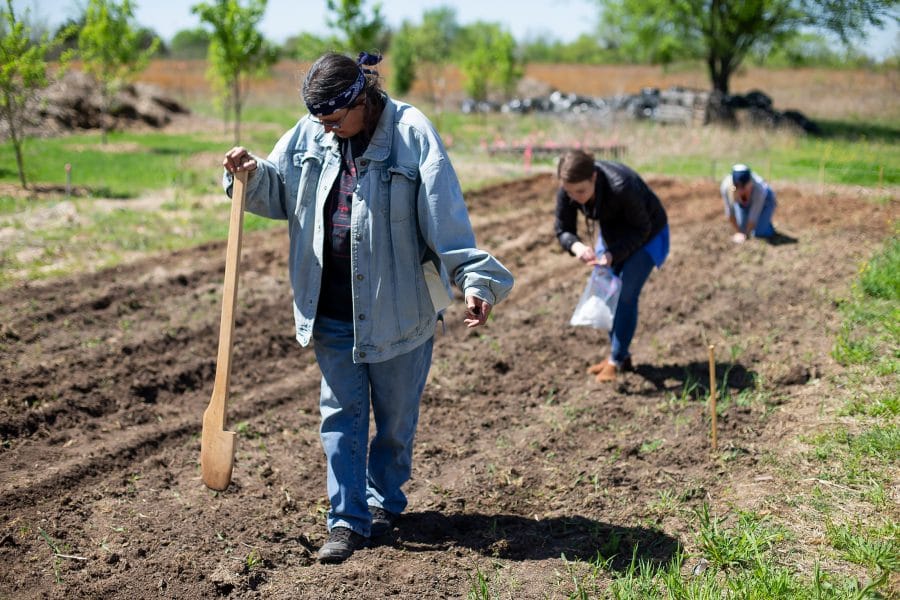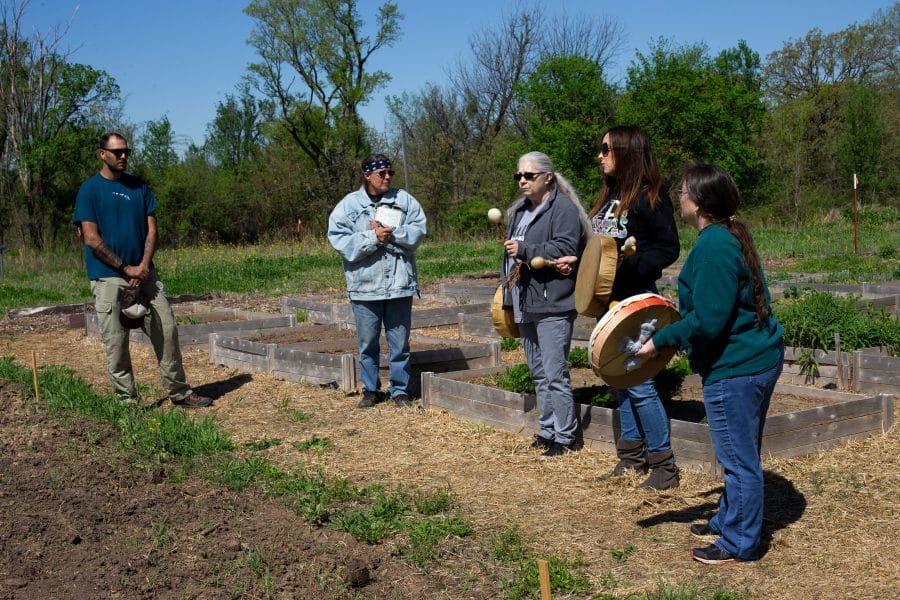Food forms a language that connects people to their heritage and culture in a unique way. Recipes, passed down from generation to generation, tie individuals together and help define cultural identity. However, centuries of colonization challenged Native Americans’ ability to access seeds, crops and cuisines that once sustained the continent’s Indigenous.

Although Indian Country has experienced a disconnect from traditional fare for a variety of reasons, recent efforts across North America encourage the rejuvenation of Indigenous plants, recipes and foraging. Citizen Potawatomi Nation’s community garden, Gtegemen (We Grow It), stands as a testament to the Tribe’s endeavors to revitalize Potawatomi agricultural customs. Garden staff educate the public through work parties and the development of a heritage seed library.
“It’s important to keep growing heritage seeds because we have a genetic connection to these seeds,” said Citizen Potawatomi Nation Community Garden Assistant Kaya DeerInWater.
Three sisters
CPN members and employees gathered at Gtegemen on April 11, 2019, for a Three Sisters planting event. Volunteers sang songs of prayer and sowed seven rows of corn in recognition of the Nishnabe Seven Fires oral tradition.
As a master’s student at the State University of New York College of Environmental Science and Forestry and Gtegemen garden assistant, DeerInWater researches the practices of other Native Americans to preserve heritage crops and helps develop the food sovereignty movement. Carl (White Eagle) Barns, who was a citizen of the Cherokee Nation, accomplished tremendous strides in preserving heritage corn varieties. arns’ lifelong dedication helped inspire DeerInWater to conserve Potawatomi heirloom plants.
Barns cultivated more than 1,500 varieties of corn and saved countless Native American heirloom crops from extinction, including the white corn planted at Gtegemen this year.
“He was kind of a living library of corn. He had people’s corn from the southwest all the way to the northeast,” DeerInWater said.

During the heritage-planting event, members of Dewegen Kwek (Women Drummers), a local Potawatomi women’s hand drum group, led songs and dedicated their performance of White Eagle in honor of Barns.
“Our cultural heritage as Nishnabe people is corn, berries, wild rice, all of those things,” DeerInWater said. “Down here in Oklahoma, since we can’t harvest wild rice, it makes sense for us to focus more on the Three Sisters and the stuff we do have.”
The Three Sisters incorporates growing corn, beans and squash together. As a form of companion planting, this technique allows the corn, beans and squash to assist each other with growth and production.
Gtegemen visitors and volunteers can find the Three Sisters garden situated on the southern end of the community garden. The seven-row plot serves as a reminder of the Potawatomi gardening techniques that date back centuries.
Seed library
DeerInWater wants to develop a seed library to inspire fellow Tribal members to begin planting and harvesting heritage Potawatomi crops.
However, a seed library’s success depends on participation. DeerInWater encourages any Tribal members with heritage seeds to email him at kdeerinwater@potawatomi.org. He hopes to build a collection to distribute to Tribal members.
Since it is a library, after the growing season ends, participants must send back the same number of seeds they borrowed to ensure the library is available for generations to come.
“Not only do we view (traditional plants) culturally as our ancestors and relatives, but our ancestors worked so hard and had such great respect for them,” DeerInWater said. “Continuing on that tradition of keeping seeds and growing the seeds that they cared for to make sure that we would have them is important.”
However, DeerInWater stressed heritage seeds should never be sold.
“That is a violation of our ancestors’ efforts to make sure that people have them,” he said.
Over time, seeds begin to lose their ability to grow. Waiting several seasons between plantings can decrease production and viability.
“Those seeds are our relatives and ancestors, and you don’t want to be an absent relative,” DeerInWater explained. “It’s a responsibility to plant the heritage seeds, and not taking care of that responsibility is not showing those seeds respect.”
Food security
The heritage seed projects and community garden help the Citizen Potawatomi hold onto their farming customs and ensure food availability in the future.
“There is the story of the Irish and the potato famine, and that happened because they put all their eggs in one basket,” DeerInWater said. “They were growing one variety of potato across the whole nation.”
Modern, corporate agriculture has increased the sale of genetically modified and hybrid seeds for popular cash crops like soybeans. In fact, since the rise of global food production, the Food and Agriculture Organization of the United Nations reported in October 2010 that up to 75 percent of the seed diversity across the world has dissipated since 1900.
According to ETC Group, which monitors and tracks data and technology around ecological and socioeconomic issues, three companies own more than 53 percent of the global seed market. As a result, there are fewer retailers to buy from, which has aided the severe genetic decline across the world.
“Heritage seed preservation is not just food sovereignty — it’s food security,” DeerInWater added.
Planting a garden can also help decrease rates of illness by encouraging people to spend time outside and eat more nutritionally dense foods. DeerInWater’s is optimistic that Gtegemen and the seed library will motivate CPN members to play a role with the revitalization of the Nation’s traditional plants.
Benefits of localized food systems
“We spend a ridiculous amount of dollars on health care, and what if we could solve that with nutrition? Food is the most basic type of medicine, and we could change things,” DeerInWater said.
Indian Country can make a positive impact on negative mental health disparities through reclaiming Native food ways.
“Research shows that even getting outside 30 minutes a day can reduce your stress down to baseline,” DeerInWater said.
Additionally, produce begins to lose its nutrition after harvest. Growing a garden and eating seasonally can provide more nourishment than grocery store produce that has traveled thousands of miles to reach consumers.
Learn about upcoming Gtegemen programming and workshops at potawatomi.org/events.
